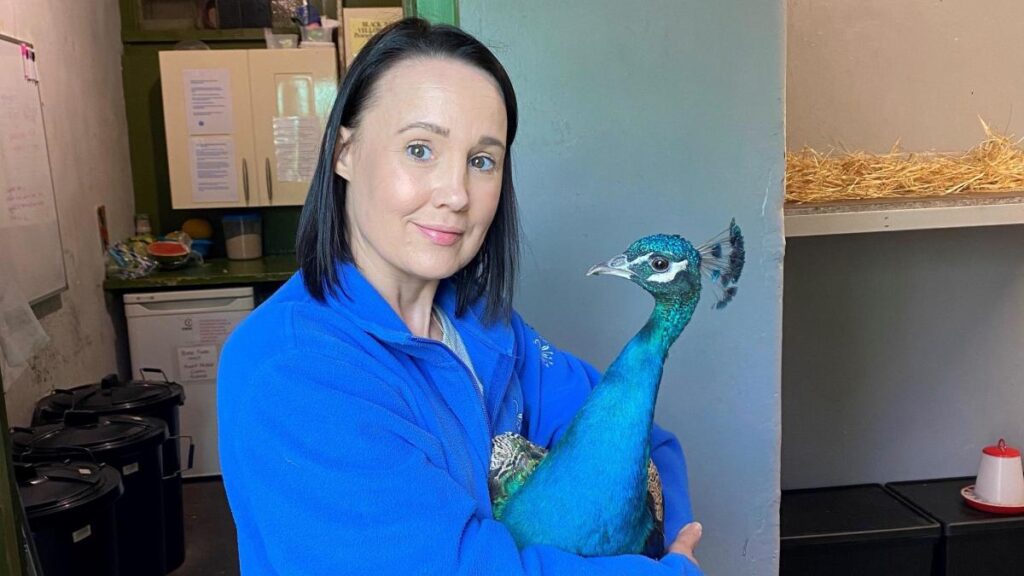The peacocks of Dunfermline have been officially granted the title of ‘City Freedom’, after laying claim to Dunfermline’s parks and streets for over a century.
The brightly coloured birds were introduced to Pittencrieff Park in 1905 when philanthropist Andrew Carnegie asked his friend Henry Beveridge to bring them from India to his birthplace.
It is believed that Beveridge returned with two breeding pairs and peacocks have been seen in the Fife town ever since.
Dunfermline was granted city status in 2022 and the peacocks are the first residents to officially receive this honour.
When they first arrived in Dunfermline, the birds were known to regularly hold up traffic on the High Street and were even spotted wandering around nearby villages.
But with no one to care for them, they led a precarious existence.
That changed almost 10 years ago when Suzi Ross was asked by her brother, who was the park manager at the time, to keep an eye on things.
In 2016, a new sanctuary was opened as part of a larger £1.6 million project to restore Pittencrieff Park to its former glory, and the population has only grown since then.
Peacocks in Pittencrieff Park is staffed by volunteers and funded by public donations. Suzi now holds the prestigious title of “lead peafowl warden”.
There are currently 21 peacocks (a term that includes both male and female birds), including eight peaches, four of which hatched earlier this month.
It costs £150 a week to feed them all.
The Freedom of the City is an age-old honor granted by city authorities. For the peacocks who are already free to come and go during the day, it probably doesn’t matter much in practice.
“We have two birds in particular, Andrew and Hamish, who like to roam,” Carlyn Cane, the head of the aviary team, told BBC Scotland News.
“They do occasionally wander out onto the road and stop traffic, but we just ask that people be very alert if that happens and let us know.”
Most birds choose to stay close to the park, returning to the reserve at night to be fed before flying off to roost in the park’s trees.
Carlyn started volunteering with the birds four years ago. “I’m there almost every day and it’s a bit crazy, but we love it and we wouldn’t change a thing.
“They are so inextricably linked to Dunfermline that everyone here knows them.
“They’re just a great symbol and they’ve been in the park for so long that everyone has memories of them.”
Two years ago, the community was shocked by a break-in at the aviary involving two young boys, aged 11 and 13. in which a peacock named Malcolm was killed.
Another peacock, Louis, was seriously injured in the incident.
“Suzi and I cared for Louis day and night for six weeks to keep him alive,” said Carolyn.
It remains an isolated incident, but other threats have come from dogs that are often walked in the park.
“We have had incidents with dogs, but generally 90% of the park visitors know there are birds and keep their dogs under control,” Carolyn said.
“But the birds can get so scared that they just fly away, and they fly into windows or walls to get away and that’s how they die. And it’s horrible.”
The student nurse even adopted a peahen who was disabled and could not survive on her own.
“She was diagnosed with dwarfism and her legs weren’t fully developed yet, so she was on medication twice a day,” she said. “She was my baby.
“I had to arrange for babysitters when I was on internship because she had to be watched constantly. But in September her tendon slipped and that was terrible.
“It happened very quickly and we took her to the vet and he gave me the weekend to say goodbye to her. Everyone was devastated by her death – she was only 16 months old.”
Wild peacocks can live up to 25 years. Male peacocks have extravagant plumage to attract mates, while females have a duller color.
Carlyn was delighted with the birds’ Freedom of the City award, adding: “They have a way of speaking to your heart, curling up and staying there.
“Once you fall in love with them, there is absolutely nothing you can do about it.
“It is good that it is recognised how important they are to the people of Dunfermline.”
Jim Leishman, the Provost of Fife and former manager of local football team Dunfermline Athletic, said the birds were “really important” to the town.
He added: “By awarding them the Freedom of the City prize, we recognise their valuable contribution and encourage their presence in and around the city.”

